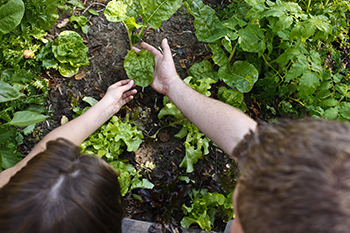Food Action fights for Washington's food and farms
by Russ Lehman
This article was originally published in March 2017

Editor’s note: PCC works closely with many organizations working to build a more sustainable food system. One of our longtime partners is Food Action (formerly the Washington Sustainable Food and Farming Network), which recently refreshed its mission and is taking on several important issues. Its vision and good work benefit all of us PCC shoppers who support good food.
From its role as a forceful advocate for the development and training of organic growing practices at Washington State University to its leadership in passing the Healthy Kids/Healthy Schools Act in 2008, our organization has been a leader in the fight for a food system that’s regenerative, healthy and equitable since its founding 20 years ago.
We’re beginning our 21st year with a new name, new brand, new location and a renewed sense of purpose.
From this point forward, Food Action will engage conscious consumers in a movement to build a food system where all people have access to food that’s good on every level: clean, healthy, delicious, and ecologically and socially regenerative.
This mission is more important than ever. The new presidential administration has promised policies that could greatly hinder progress toward building sustainable food and ag systems.
Food Action will step up to fight for the sustainable food ideals we believe in in a number of ways.
For one, we’ll communicate to lawmakers about how essential sustainable agriculture is to our economy, environment and public health. While legislators hear often from conventional ag representatives, they rarely hear from the large contingent of farmers who grow with a commitment to healthy soil and people. We’ll advocate to policymakers on behalf of sustainable food producers and consumers around the state.
In the coming months we’re also planning two major initiatives. The Protect Washington Agriculture campaign we’re considering will work to protect our agricultural products from both the serious reduction in market opportunities and the environmental and health risks of genetically engineered seeds. We’ll also work with a coalition of good food advocates to pass a soda tax, similar to those that passed recently in other parts of the country.
We’re at a critical moment in the fight for a sustainable, fair food system. Will we focus our time and energy fighting for or against something? Do we fight for food security, or against food insecurity? Do we promote and celebrate organic farms, or fight against conventional, chemical-heavy industrial operations? The answer is simple: both are necessary. We must expose those who are doing wrong and demand changes for the greater good. We also must take action to find and share the solutions we need.
EVENT:
Good Food and Farming Advocacy Day
Monday, March 6
While supporting local, organic food by shopping at farmers markets and co-ops like PCC is a real way to effect change, some problems in the food system only can be addressed by statutory or regulatory measures. From the way we subsidize destructive agricultural practices, to the lack of resources for schools to offer healthful, organic food, it’s our politicians who must act.
Join us in Olympia as we meet with key policymakers to communicate the importance of sustainable food systems.
To learn more and sign up, visit wsffn.org.
Russ Lehman is the executive director of Food Action.
